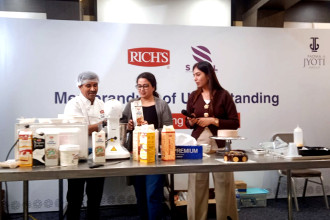-1756379880.jpeg)
BIRATNAGAR: Officials from the Chamber of Industries Morang (CIM) held talks today with Israel’s Ambassador to Nepal, Shmulik Arie Bass, on expanding bilateral trade, promoting private sector cooperation, technology transfer and other business opportunities between the two countries.
The discussions focused on identifying each nation’s strengths and exploring possibilities for joint ventures and investment. CIM president Nand Kishor Rathi said, “If we can identify each other’s capacities and explore possibilities for business partnership, we can create a favourable environment for investment and joint ventures between Nepali and Israeli entrepreneurs.”
-1756379879.jpeg)
Rathi highlighted Israel’s advances in technology, innovation and modern agricultural practices and opined that Nepal, also an agricultural nation, could benefit from Israeli expertise in greenhouse technology, crop management and processing. He urged Ambassador Bass’s assistance in strengthening economic and industrial relations through knowledge exchange, training programmes and investment.
On the occasion, Ambassador Bass described trade and business as foundations for both economic growth and social transformation. He affirmed Israel’s interest in learning more about Nepal’s economic and productive capacity and called for joint studies of potential Nepali exports. “With coordinated action by relevant authorities, Nepali industries and businesses can reach international markets,” he said.
The ambassador added that Israel’s technical expertise could boost Nepal’s productivity, agricultural modernisation and entrepreneurial development. “Such partnerships will contribute to long-term investment, skill exchange, job creation and mutual benefit,” he said.
Paras Luniya, CIM treasurer and convenor of the International Trade Promotion Committee, mentioned that bilateral trade exceeds $9 million annually but remains heavily in Israel’s favour. He identified carpets, handicrafts and leather goods as key Nepali exports, and packaged medicines, broadcasting and telecommunications equipment, and agricultural machinery as major imports from Israel.
Luniya pointed to agriculture and agricultural technology, including drip-irrigation systems, as well as information technology and the manufacturing of paper products, nappies, and sanitary pads, as potential areas for cooperation. He also proposed joint pilot projects in Koshi Province using Israeli farming technologies.
In a different context, he reported that over 4,500 Nepali caregivers are currently employed in Israel, contributing to both economies, and praised the 'Learn and Earn' programme’s scholarships and technical training in education, tourism, ICT and manufacturing. Luniya requested Ambassador Bass’s intervention to secure the release of Nepali national Bipin Joshi, who has been missing for some time.
Likewise, CIM Vice President Bipin Kabra called for direct air cargo services between Nepal and Israel to boost trade, while immediate past president Rakesh Surana urged Israel to assist Nepal through technology transfer based on its agricultural modernisation achievements.






